![]()
The Words of Sun Myung Moon For 1990
|
|
The Words of Sun Myung Moon For 1990 |
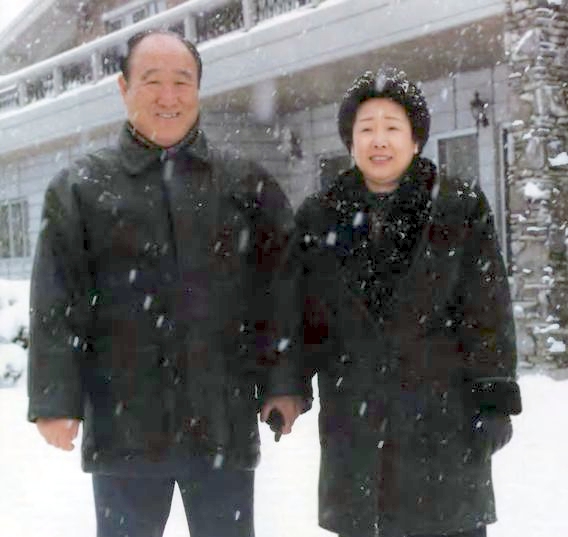
Father
and Mother enjoying the new snow at Hannam-dong on the eve of their
birthday celebration.
Mr. Chairman, Distinguished former Heads of State, Prime Ministers of Government, Honorable Legislators and Ambassadors, Ladies and Gentlemen:
I am pleased and honored to welcome you to Korea for this important conference. I am very glad that we are gathered together for the Second Summit Council for World
Peace with the theme of the Reunification of Korea and Cooperation between East and West. Furthermore, I am very happy that together with this Summit Conference, we are convening the Eighth Conference of the Association for the Unity of Latin America, commonly known as AULA, which has a tremendous record of achievement in bringing about the harmony and unity of Latin America over the last seven years.
I truly feel that the timing of this conference is very significant. This is the beginning of 1990, and the new decade of the nineties. In 10 years, we are going to usher in the year 2000. In our lifetime, we will witness the beginning of the new millennium. We must feel the tremendous importance of living in this time, and not only witnessing dramatic changes in human life, but actually shaping those events.
It is a hope shared by all of us that the new millennium be characterized by true peace. For that to be so, the next 10 years will be challenging and demanding. These organizations which have gathered here today, the Summit Council for World Peace and AULA, have a very important part to play during the next ten years. I extend my heartfelt congratulations to you for the work you have already done for the achievement of peace. At the same time I would like to challenge you to become the champions of peace of the new decade.
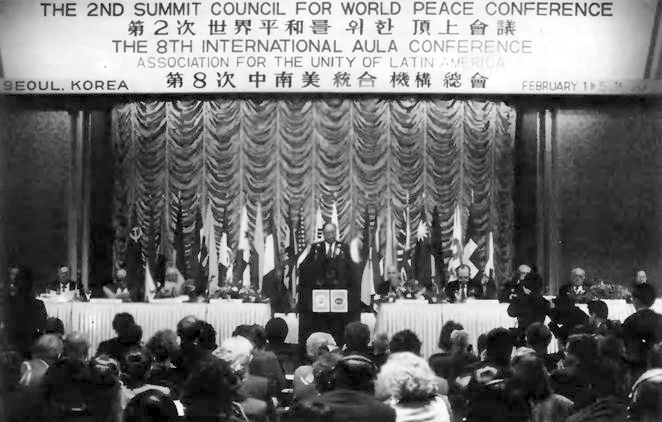
Father
addresses the Plenary Session of the Summit and AULA Conferences.
The period between the close of World War II and the present, roughly 40 years, can be viewed as the age of confrontation between two camps of diametrically opposed ideologies. There have been numerous conflicts between people and between nations, accompanied by an escalating arms race. There was really no moment in this time when people could have a feeling of peace in their hearts.
Then, in 1985, Mr. Gorbachev came to power in the Soviet Union, and began to initiate a series of changes. He encouraged greater freedoms of expression within the Soviet Union, undertook a restructuring of the Soviet economy, and, perhaps most significantly, repudiated the Brezhnev doctrine. Within a short time, dramatic political change within the Soviet bloc became a daily occurrence. In the past few months we have seen the democratization of Poland, followed by Hungary, East Germany, Czechoslovakia, Bulgaria, and finally Romania. These events were accompanied by the crumbling of the Berlin Wall, the symbol of confrontation between East and West. With that, a new era of reconciliation has dawned.
I would like to extend my hearty congratulations to President Gorbachev for his courage and leadership in bringing about these constructive changes, enabling us to usher in this new era of cooperation. I am committed to supporting the Soviet Union in their genuine desire to uphold individual human dignity, and bring about both economic reform, and most importantly, religious freedom.
As you may already know, I am also committed to working together with the People's Republic of China. This giant nation comprises one fourth of the world's population. Certainly we cannot talk about world peace without taking into account the well-being of the 1.3 billion Chinese people. To help in providing needed jobs, technology, and income, I am now building one of the world's largest automobile assembly plants in China. This is another aspect of our efforts for world peace.
Furthermore, as you may know, in 1981 I launched an International Peace Highway project. When completed, this highway will allow a family car to be driven from Tokyo to London. I am seriously discussing the project with the governments of Japan, Korea and China, and I hope that the Soviet Union will also welcome this project. Of course, this is a lofty dream, but every great undertaking begins as a dream. Not so long ago, no one could even have dreamed of men walking on the moon, but with a vision and hard work, it became a reality. So it will be with the International Peace Highway.
At this point, having shared with you my tremendous feelings of hope and optimism for the future, I feel that I must also address what I consider to be a dangerous tendency by some people to celebrate prematurely the coming of peace. Although the Berlin Wall has fallen, tremendous difficulties remain in both camps. The leading nations of the free world, along with their vast material wealth, are beset with the problem of moral decay. They have fallen victim to a pervasive materialism, and freedom is often abused. Furthermore, the rise to near dominance of atheistic secularism in the West has brought with it the collapse of moral standards. As a result, Western society is afflicted with serious social ills, among them the break-up of families, an epidemic of drug abuse, an increase in sexual crimes and diseases, and widespread governmental corruption.
To put the matter simply, the current problems of both East and West are ultimately coming from the same source -- a confusion of values. Communism has failed because the Marxist value system has proven to be false. It is no secret that I have been ardently opposed to communism throughout my life. I have been so because I know that the militant denial of God and the belief that progress occurs through conflict can never lead to success in building a good society. Through my own life experience I have come to know of a certainty that God is real, and the most important thing in life is true love. Human progress can come about only when God is cherished, and love is given the highest value. Clearly, neither communism nor the free world is presently equipped to lead mankind toward a peaceful 21st Century.
What we urgently need at the outset of this new decade is a true value system to fill the vacuum created by the collapse of values in both the free and communist worlds. That new value system must be based on the ideology of Godism -- a worldview centered on God. Throughout my entire life, I have been working with members of all religions and denominations to advance the understanding of this God-centered worldview. In this way, it has been possible to create numerous broad-based academic and religious organizations dedicated to the search for absolute values, and the establishment of true peace. I have also established news media organizations, as well as institutions of art and education. This entire world-wide foundation has been prepared to assist persons such as yourselves in your efforts to attain true world peace.
True world peace cannot be achieved without a clear value system shared by all. When values are clarified, humankind will no longer be in darkness. Godism allows each individual to clearly see the meaning and value of his life. Each person is then motivated to seek his own spiritual well-being by living responsibly and serving his fellow man. This is the ultimate solution to world suffering.
In other words, what our world needs today to save itself is a spectacular spiritual awakening. The world must be awakened into the reality of God and equipped with a world view based on God-affirming principles. This world view will be capable of eliminating the confusion in the value systems of both camps.
Based upon such an awakening into higher values, the nature of the relationships between nations must be transformed. Until now, the driving force behind economic development has generally been the desire for profits. In this way, a great amount of human potential has been unleashed, and remarkable world development has occurred. However, the desire for profits must be balanced with the fundamental understanding that all people are the children of God. We are all brothers and sisters. Furthermore, the purpose of our life on earth is not to amass material goods. We are alive in this world so that we can develop and perfect our eternal spirit. The only way to do this is through the practice of true love; that is, living for the sake of others.
True love must be practiced on all levels of life, including the relations between nations. The developed nations of the world should feel that they have been blessed by God for the purpose of helping others. They must be willing to sacrifice themselves for the underdeveloped nations of the world. If the prosperous nations do not think in loftier terms than the desire for profits, their prosperity will slip away in spite of their efforts to retain it.
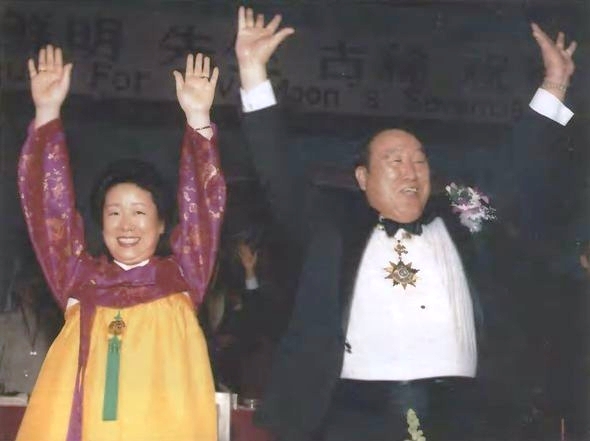
Today, Korea is the point of convergence of the key nations of China, Japan, the Soviet Union, and the United States. At the time of the Korean War, people of many nations made the supreme sacrifice to determine the future of this peninsula. We have gathered here today in the same spirit of concern. It is entirely appropriate that political leaders from around the world should come here to discuss the issue of Korean unification. Historically, this is more than a national issue. It involves the entire international community.
I would like to suggest a few guidelines which I hope you will consider in your discussions about the unification of Korea. With regard to North Korea, there are several prerequisites to the process of reunification. First, North Korea must abandon its plans for a military conquest of the South. Second, they must put an end to their extreme isolation and open their society to the world community of nations. Third, they must carry out their own version of glasnost, thereby giving their people the most important freedom, the freedom to worship as they desire, and they must put a stop to the deification of their leader.
Only then will North Korea be ready to undertake effective economic reforms. As North Korea begins to cooperate with South Korea and the other nations of the world, it will become more and more evident to them that unless people are given realistic hope for a better life, as well as incentive to achieve it, it is virtually impossible to increase human productivity.
I want to emphasize, however, that there must also be change in South Korea. South Korea has been experiencing an unprecedented wave of prosperity. This prosperity must be seen for what it is -- the blessing of God -- and it must be shared with others. This nation must now be ready and willing to embrace our brothers and sisters in the North, and help to alleviate their suffering. In the same way, the free world must now totally support the initiatives toward freedom which have been made in Eastern Europe, the Soviet Union and China.
The Bible tells the story of two brothers, Jacob and Esau. Though they were both destined to play an important part in the providence of God, there was a great conflict between them. Jacob was blessed by his father, but only after some trickery. When Esau learned of this, he wanted to kill Jacob, and Jacob had to flee. It was only after they had lived separately for more than twenty years that Jacob returned with gifts and with love in his heart for Esau. When the two brothers met after this long period of separation, Jacob approached Esau and said, "When I look at you, I see the face of God." They forgave each other, and embraced in tears. Esau no longer wanted to kill Jacob, but to live with him, share with him and learn from him.
Today the free world stands in the position of Jacob. The communist world stands in the position of Esau. Many communist nations, such as Cuba and North Korea, have been taught that, like Jacob, the free world has stolen the blessing from them. Like Esau, in the past they have wanted to destroy the nations of the free world. Like Jacob, for many years, the free world has wisely stayed militarily strong and avoided falling into a position where the communist world could destroy her. However, I believe that now the time has come for the free world to be reconciled with the communist world. When we see our brothers and sisters who have been suffering for many years in the communist system, we must see in them the "face of God." We must support them, comfort them, fill them with confidence, and allow them to enter the world community of democratic nations.
Ladies and gentlemen, I hope your deliberations over the next two days will be productive and rewarding. I am certain that because of such efforts as these, Korea will be one unified nation well before the end of this decade. On behalf of sixty million Korean people of both the north and south, I want to express my gratitude that you have come. I pray that your efforts will be fruitful.
God bless you. Thank you very much.
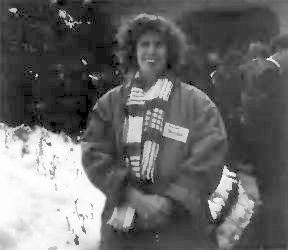
Mary
Trifault, standing in front of True Parents' home.
Flying on Korean Airlines is our first taste of being in Korea -- about 95 percent of the passengers are Oriental. Through the English language Korean newspapers on board we learn that the day of our arrival coincides with the three-day Lunar New Year's celebration. Also, that President Roh's party and two of the three main opposition parties are on the verge of a merger, and that temperatures are truly frigid all throughout Korea -- perhaps a purification condition on nature's part to prepare for Father's birthday.
My companions, Rev. David Hose and Kathy Coman, both of whom have spent more time in Korea than I, express a deep feeling of coming "home" as we approach Korea.
Rev. Hose, thankfully, can communicate to the cab driver in Korea, and we drive into Seoul to stay at the Unification Church International Training Center, a former school converted into a guest hotel and convention center. It's quite deluxe, and in a very central location in Seoul, on the same land as the Segye Ilbo complex. After hearing stories of sleeping bags for past Blessing participants in Korea, it is a nice surprise. On our first evening here, it is just we three and one other early arrival who have dinner at the 300-person capacity dining room. Over the next few days world missionaries and leaders from the West will arrive, until the guest hotel is humming with activity and conversation about Father's upcoming birthday celebration.
The first day or two are quiet, so I have some time to pray. The ease of tearful prayer surprises me, as I repent in preparation for Father's birthday. How small and even negative my foundation was when I joined the church seems in contrast to Father's lifelong battle of giving, suffering, pioneering spiritual world, loving his enemies in prisons, sacrificing himself, Mother, their family and our church over a 70-year period, all to make an incredible worldwide foundation.
On Sunday we are able to hear Father speak at Chungpadong Church. It's a good experience to hear Father speak entirely in Korean. Although a few words are familiar, the only gage I have of what he is saying is the response of the audience, which ranges from serious in the beginning to more light, having give and take with Father. It is a humbling reminder of the need to learn Korean.
We hear that members have returned to their hometowns, 3360 villages throughout Korea, to hold concurrent birthday celebrations. The Committee for the Unification of North and South is organizing the celebrations and sending professors as speakers on the Unification of Korea and Father's life. Through this, True Parents are proclaimed all over Korea.
It is a very deep experience being with the missionaries. Each night at dinner the person opposite me is someone whose testimony reveals such deep faith, humor and creativity in their mission. Seeing the give and take between the missionaries, many of whom have not seen each other for years, shows how strong friendships are forged through common suffering. One Japanese missionary to Afghanistan stayed there for 13 years, never leaving for fear of losing his visa. He and his wife had three children there. In 1984, his wife had several dreams of Heung Jin Nim, but only learned four months later about his Ascension. They were almost totally isolated from communication with other members, and had not seen True Parents since their Blessing in 1975.
Several of the mobilized members in Korea came to visit us at the training center. Many of them struggled so much with the food, the culture, the language and customs when they first came; it seems that those who stayed have brought victory, both internally and externally, by beginning to feel comfortable with the language and bringing spiritual children. I am able to do an interview with Nate Windman, who heads the Western mobilized members, and through him I can gain a much deeper feeling about the purpose, struggles and victories of the Mobilization.
The deepest experience is meeting the East European representatives. Many of them were able to receive visas to come only days before the birthday celebration. Their stories of how they participated in growing freedom movements which, on the foundation of God and True Parents' tearful foundation, gained victory in their countries in just a few months are amazing.
Even the weather participates in preparing for Father's birthday. It is three days before February 1 as the snow starts, and it will continue for seven days, covering Seoul with a record-breaking three feet of snow -- the most in at least seventy years. I am told that snow on a special day or a birthday indicates good fortune. This beautiful extra touch of purification to the environment certainly helps us to reflect on our own purification.
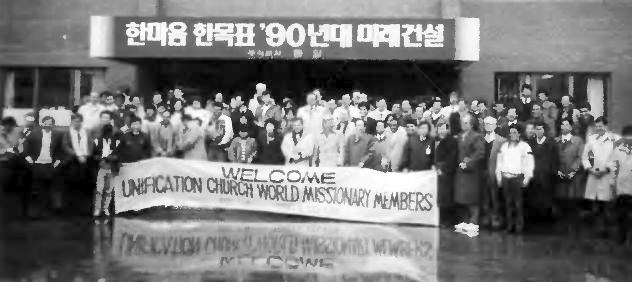
The
Tong-il Factory gives a warm welcome to the missionaries.
It is together with a deep sense of expectation in the spiritual atmosphere that we prepare our Holy Gowns for the special pledge ceremony at the Little Angel's School on Father's birthday. As we gather here to await Father's and Mother's arrival, I shed tears again, considering the ideal of true love we are striving for, how difficult it is for us many times, and how much we really need to understand Father's life. I feel the spiritual world so close, with all our ancestors tearful and grateful to see Father's fulfillment of seventy years of life. This is also a fulfillment for Mother, surrounded by her children and their spouses.
Father and Mother wear a set of traditional Korean dresses and crowns -- everything is permeated with a deep sense of tradition and creating a new history of heaven.
After the ceremony, we are bused to Chamshil Stadium. As people pour into the grand stadium, it is amazing to see so many international leaders honoring Father (see the AULA and Summit Conference article). It is especially touching to see several beautiful birthday gifts presented to True Parents at the end of the ceremony, and to hear an inspiring musical tribute sung by Soprano Young Hee Son and the Hanuri Women's Choir.
As we leave the stadium, each one of us is presented with a beautifully wrapped gift -- birthday cake. It is another small example of how, although we are here to honor Father, it is actually he who continues to pour his heart and blessings out to us.
The day continues with a whirlwind entertainment gala. The entertainment represents 137 countries and the famous Sejong National Cultural Center is fabulous. Its theme is, "Unification of One World Under God," and is dedicated to the Unification of North and South Korea.
Each presentation -- by Korea, Japan, Brazil, Australia, Thailand, the Philippines -- is strikingly different and shows different aspects of Heavenly Father's personality. A colorful and flowing Korean folk dance is followed by a beautiful, precise Japanese dance; the Brazilian samba is rhythmic and exotic -- from a "hot" climate; the Thai dancers mystical and the Philippines performance lively and pure in heart. Next is a special ballet selection with Hoon Sook Nim, then a unique light show and finale.
The evening banquet tops off the day. Father and Mother are seated in the center of a huge VIP table, and graciously receive beautiful tributes: a special medal, honorary degrees, and a signed poster from the Kirov Ballet members.
The foreign missionaries are invited to the Plenary Session for the Summit and AULA Conference at the Lotte Hotel. Father is introduced by former Senator Paul Laxalt, Mr. Arnaud de Borgrave and Amb. Jose Chaves, who says, "After so many introductions, the one word that really sums up Rev. Moon is, 'Father.'" Father reads the opening speech in English and receives a standing ovation.
In the afternoon, we attend a PWPA Conference, and proceed from there to the American entertainment night. Seeing Nolbu/Hungbu and hearing the music by the New Hope Singers International, I am reminded that art is the main occupation in the Kingdom of Heaven, and music is especially expressive of God's heart. The talent of the True and blessed children shines through and the audience's delight at seeing True Children perform is overflowing. The finale is especially moving, with all of the True Family coming to the stage to sing -- from the youngest ones to the older ones and their spouses. In their rendition of "Home on the Range" in both Korean and English, we can feel their longing for a true home.
At nine a.m., True Father comes to our International Training Center to speak to 1,000 Japanese home members, and the missionaries are invited to attend. The response of the Japanese, most of whom have never met Father, is tearful. At the end of the speech, True Father gives awards to the countries who have brought the greatest achievement and growth over the past several years -- Japan receives first place and Thailand, second.
That evening, we get the blessing to see Julia Hoon Sook Moon perform with the Kirov Ballet Company at Sejong's Cultural Center. It is such a special historical moment -- these Russian performers must be overwhelmed by all the events surrounding Father's birthday.
Rev. Kwak officially announces a seven day workshop for the missionaries. Mr. Kuboki gives a testimony to us about the Japanese movement. (It will appear in an upcoming Today's World.)
In the afternoon, the members from Eastern Europe organize a trip to the old and new Chungpadong Church. I am excited to go along, because it is such a special time to share with the East Europeans. They have such a fresh, pure perspective as they make their pilgrimage to these historical places. In the new Chungpadong Church, we are greeted by the Moksanim, the minister of the church, who, as soon as he hears members from Eastern Europe are visiting, comes to greet them. He gives his special testimony, explaining that in 1974, after the Madison Square Garden Rally, Father gathered missionaries appointed to communist countries at the Chungpadong Church (where we are presently seated and listening). Father asked them several times to "Look at my face -- we may never see each other again until spirit world." The Moksanim said since that time Father has shed tears many times while praying for the communist countries' missionaries.
True Children would say to Father, "You should speak less because of your health," and Father would respond, "I know that at this moment there are brothers and sisters in prison in communists countries, suffering in the satanic world; how can I rest?" This Moksa-nim had seen Father a couple of days prior to our visit, and relays a message from Father to the East Europeans, that he was "so grateful to see your living faces again, along with new brothers and sisters from Eastern Europe."
Many of the East Europeans begin to weep, and when asked who among them had been at that original meeting, and who had spent time in prison for witnessing, several hands are raised for both categories. One sister testifies, "When I was in prison, I saw no sun for one year, but Sun Myung Moon was my sun." It is such a tearful, moving moment -- perhaps the deepest of the whole time in Korea for me.
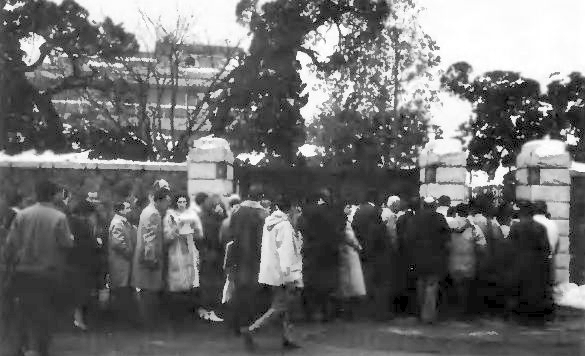
Invited
by True Parents, excited world missionaries enter the gates of
Hannam-dong.
Today is a special day, for it's been announced that all foreign missionaries are invited to visit Father in Hannam-dong. I hadn't imagined to have that opportunity. We all get on buses, expectant like children at the opportunity to meet Father in such a personal setting.
In Hannam-dong, we all crowd into the meeting room and greet Father as he arrives. Truly exciting things happen during this meeting. After speaking about True Abel to the missionaries (see True Abel, p. 4) Father calls up the East and West European leaders and begins creating sister nations. It is incredible to see the joy on the faces of the East Europeans as Father does this, and to see the national leaders from East and West embrace as Father "matches" them. Father also gives a representative gift, for members who spent time in prison, to the national leader of Czechoslovakia. From this event and Father's words, everyone feels how much Father's heart is with the East European and communist countries' providence at this time.
After lunch, we enjoy moments outside in the yard, where there is over a foot of snow, throwing snowballs and having photos taken together with other members, mementos of the visit to Hannam-dong.
President Young Whi Kim lectures the Principle of Creation to us. His main point about the Creation lecture is that through it we are supposed to be able to convince anyone of God's existence. An especially good clarification of Father's viewpoint about evolution prompts exciting questions and responses from the audience. Being from a scientific background, I appreciate his examples and logic.
In the evening, we attend Japanese Night. After several presentations, the highlight of their offering is an opera entitled "The Heavenly Flute," sung in Korean by the all-Japanese cast (except for the narrator, who is Korean). There must have been an incredible investment to learn Korean -- it is moving to see this effort on the part of the Japanese members to unite with Korea.
Anton, the Czechoslovakian national leader, gives us his testimony, representing all East European members. The depth of spirituality present in the early church in Czechoslovakia is an eye-opener for me. Because these members have never been seen by Western members before, and in general we have received little news from communist countries, it is like another world opening up. It is a miracle to hear the testimony and to realize that these brothers and sisters have been working for True Parents for many years.
It is announced that we will make a lightning tour of Korea -- to the Tong-il Factory, Pusan, the Rock of Tears, the most famous Korean Buddhist temple, Song Hwa University, and back to Seoul.
Three buses carrying missionaries head south to Pusan, watching the countryside from the windows, observing how every square arable inch is well cultivated.
In Pusan, we wind through the small back streets that make their way upward though small dwellings and shops to the site of the original cardboard church in Pusan and the Rock of Tears. After entering what is now a museum and getting a history of Father's and Rev. Won Pil Kim's experiences there, we go outside and head up the hill with colorful umbrellas given by several halmoni's waiting outside in the rain.
At the top of the hill, we see a small sign that reads, in Korean and English, "At this place where we pray for the Fatherland, nation and world, take off your shoes as you enter." We all crowd onto the rock that overlooks Pusan harbor, and one representative prays: "How many times we prayed and didn't even know that there were members working behind the Iron Curtain." Again, there are prayers filled with many tears of gratitude or repentance in many different languages. Afterwards, one Czechoslovakian brother tells me, "We could only dream of the Rock of Tears before -- to actually be here is almost unbelievable." Another missionary commented: "Father used to look out over the ocean, praying for the world, all alone. Now, years later, we are here, praying and representing the world. How serious Father is for us to fulfill our missions." I felt, yes, my mission is really to be bolder for God and True Parents at this time in history. Rev. David Hose said he felt a "meltdown, powerful tearful experience" even before the prayer at the Rock of Tears started.
That evening at a restaurant, we hold a special celebration for the Blessing anniversary of the 1800 Couples, from among whom Father sent out the first 120 worldwide missionaries.
The next day the sun breaks brilliantly, and we head north to the hills to Poonsa Temple, the biggest Buddhist temple in Korea. The air is pure and it's a nice time to be together, exploring the religious history of Korea.
Our last outing is to Song Hwa University in Chonan, where we are able to meet some of the professors. President S. W. Yoon presents a history and vision of this international university. There is a sense of history in the making because just a couple of months earlier the Korean seminary received official permission from the government to begin operating as a four-year university. We see several of the national leaders from Europe and other countries already here, having begun their intensive study course just the day before, settling in for their year-long sojourn in the Korean language. It is so exciting to see worldwide leadership studying to become fluent in the Parents' language.
This is the last day for most of the missionaries. We receive our final guidance from Rev. Kwak about fulfilling Jacob's course, giving an elder brother's push to really accomplish in the mission countries by aggressively uniting with True Parents' direction.
Last-minute addresses are exchanged, gifts purchased and bags packed. A couple of buses arrive to take us to the airport, and the good-byes are heartfelt. This was my second trip to Korea, yet I feel I have learned so much more about True Parents and the Fatherland. Father completely loved and served us -- from external to internal. I think many left feeling this was truly "home" to them.